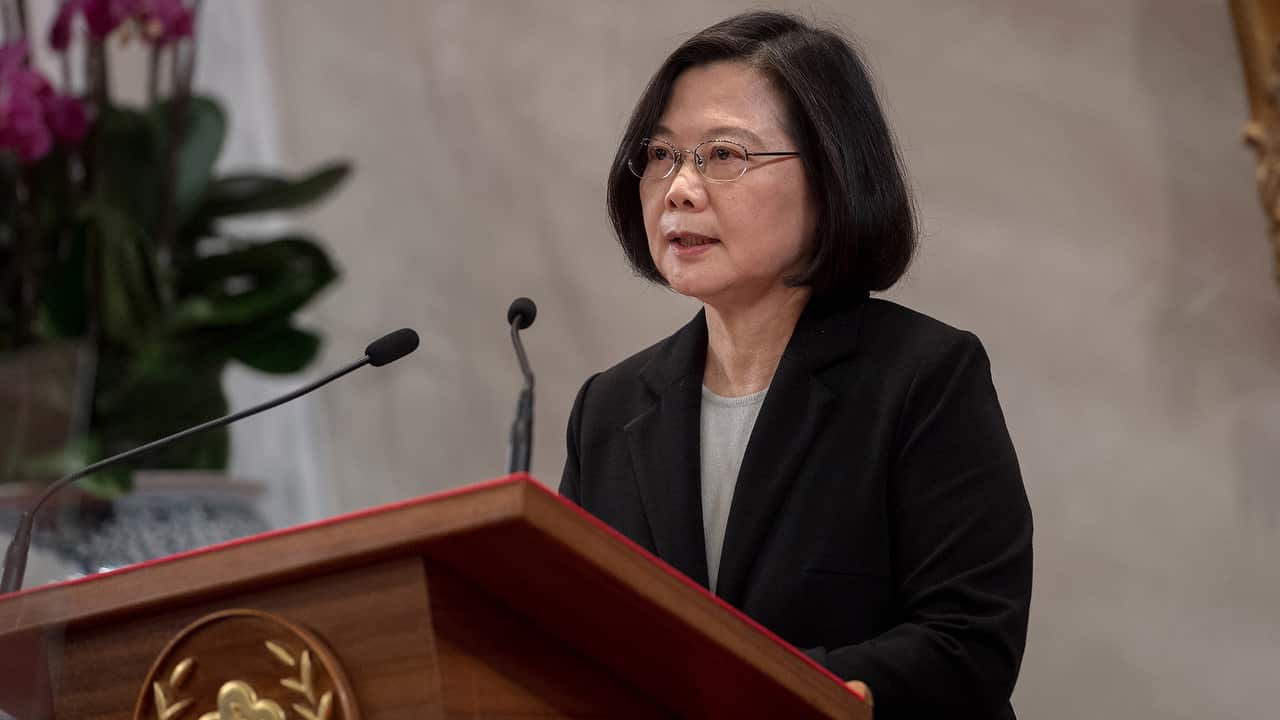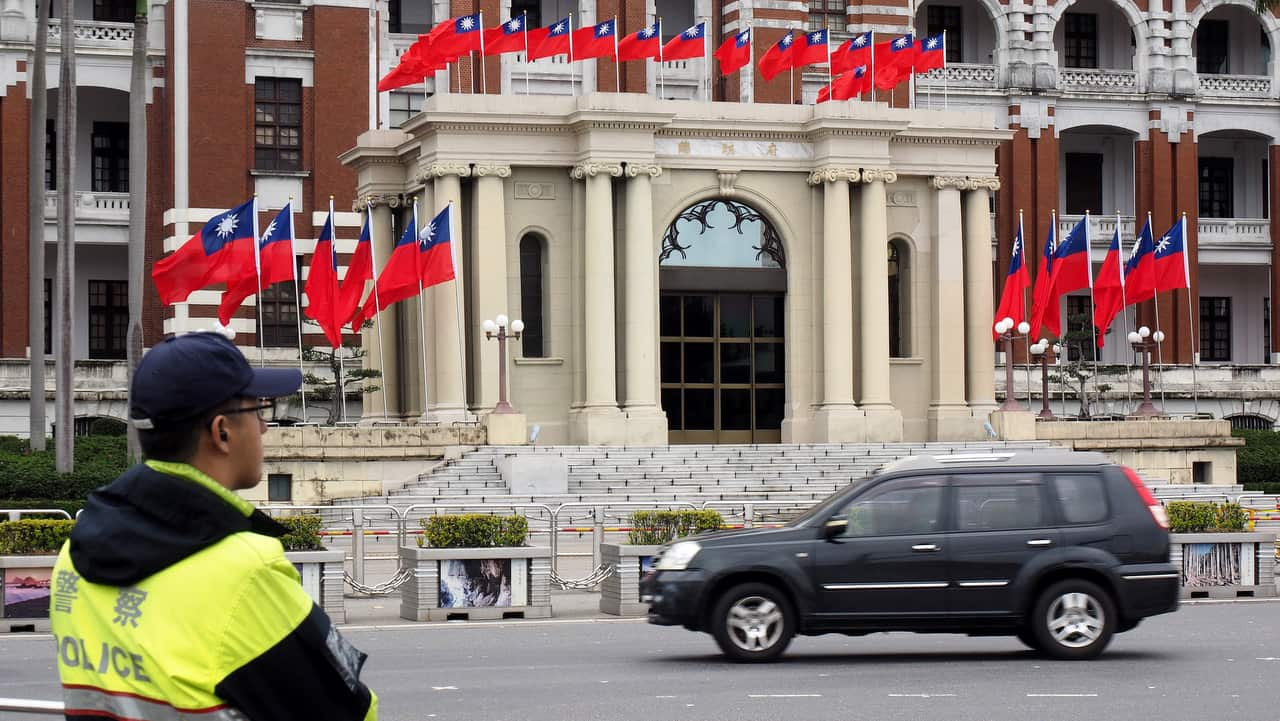President Tsai Ing-wen said Taiwan island would not accept a “one country, two systems” political arrangement with China, while stressing all cross-strait negotiations needed to be on a government-to-government basis.
"I hereby reiterate that Taiwan will definitely not accept 'One country, two systems'.
"The majority of Taiwan's public opinion also adamantly rejects 'One country, two systems', and also the 'Taiwan consensus'."

Tsai spoke after Chinese President Xi Jinping said in a speech earlier on Wednesday that nobody can change the fact that Taiwan is part of China, and that people on both sides of the Taiwan Strait should seek “reunification”.
Tsai also urged China to understand Taiwanese people’s thinking and needs.
"China has to squarely face the factual existence of the Republic of China, Taiwan, instead of denying the democratic system that the Taiwanese people have built together.
"Secondly, China has to respect the 23 million Taiwanese people's persistence on freedom and democracy, instead of interfering with Taiwan's choice of democracy by polarizing (Taiwan's society) and luring (talents)."
In a new year’s speech earlier this week, Tsai said China must use peaceful means to resolve its differences with Taiwan and respect its democratic values.
President Xi Jinping used his new year's speech to call for the reunification of Taiwan with China, saying the country reserves the right to use force to do so, but would prefer for the process to be peaceful.

Taiwan is China’s most sensitive issue and is claimed by Beijing as its sacred territory.
Xi has stepped up pressure on the democratic island since Tsai Ing-wen from the pro-independence Democratic Progressive Party became president in 2016.
Xi has set great personal store in resolving what the Communist Party calls the “Taiwan issue”, holding a landmark meeting with then Taiwan president Ma Ying-jeou in Singapore in late 2015, just before Tsai was elected.
Xi spoke at Beijing’s Great Hall of the People on the 40th anniversary of a landmark Taiwan policy statement.
He said “reunification” must come under a one-China principle that accepts Taiwan as part of China, anathema to supporters of Taiwan independence, adding that the “one country, two systems” model of autonomy, with which China governs Hong Kong, was the best way for Taiwan.
China translates the word “tong yi” as “reunification”, but it can also be translated as “unification”, a term in English preferred by supporters of Taiwan independence who point out the Communist government has never ruled Taiwan and so it cannot be “reunified”.
The vast majority of Taiwan’s people are clearly aware that Taiwan independence would lead to a “grave disaster”, Xi told an audience that included Taiwan business people and senior party officials.
“Chinese people don’t attack other Chinese people. We are willing to use the greatest sincerity and expend the greatest hard work to strive for the prospect of peaceful reunification,” Xi said.
“We do not promise to renounce the use of force and reserve the option to use all necessary measures” to achieve this goal and prevent Taiwan independence, he said.
This, though, was aimed at foreign forces who sought to interfere and the tiny minority of Taiwan independence forces and their activities, Xi said without elaborating in what was likely a reference to the United States, Taiwan’s strongest backer.
Underscoring China’s nervousness about US support in particular for Taiwan, US President Donald Trump on Monday signed into law the Asia Reassurance Initiative Act, which reaffirms the US commitment to Taiwan, including arms sales.
'Lasting peace'
Xi sought to reassure people in Taiwan that there was nothing to fear from Chinese rule, even though most people there have shown no interest in being run by autocratic Beijing.
“After peaceful reunification, Taiwan will have lasting peace and the people will enjoy good and prosperous lives. With the great motherland’s support, Taiwan compatriots’ welfare will be even better, their development space will be even greater,” Xi said.

Tsai, who says she wants to maintain the status quo with China, said on Tuesday China must use peaceful means to resolve its differences with Taiwan and respect its democratic values.
Beijing has regularly sent military aircraft and ships to circle the island on drills in the past few years and has heaped pressure on the island internationally, including whittling down its few remaining diplomatic allies.
Taiwan is gearing up for presidential elections in a year. Tsai’s party suffered stinging losses to the China-friendly Kuomintang in mayoral and local elections in November.
Xi was speaking on the anniversary of the “Message to Compatriots in Taiwan” on Jan. 1, 1979, when China declared an end to what had been routine artillery bombardment of Taiwan-controlled offshore islands and offered to open up communication between the two sides.
However, the offer was rebuffed by Taiwan’s then-president Chiang Ching-kuo, who in April that year came out with a “three nos” policy of no contact, no compromise and no negotiation with China.
Chiang only relaxed that in 1987, allowing people in Taiwan to visit China for family reunions. His father, Chiang Kai-shek, fled with defeated Nationalist forces to Taiwan in December 1949 after losing a civil war to the Communists.

